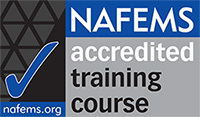Who Should Attend?
Engineers and managers with limited CFD knowledge who are interested in or considering incorporating CFD in their design practices.
Interested?
Get in touch to discuss your next steps with our experienced training team. We can work closely with you to understand your specific requirements, cater for your specific industry sector or analysis type, and produce a truly personalised training solution for your organisation.
All NAFEMS training courses are entirely code independent, meaning they are suitable for users of any software package.
Courses are available to both members and non-members of NAFEMS, although member organisations will enjoy a significant discount on all fees.
NAFEMS course tutors enjoy a world-class reputation in the engineering analysis community, and with decades of experience between them, will deliver tangible benefits to you, your analysis team, and your wider organisation.
Find out more
“Even experienced CFD users find choosing the right turbulence model a challenge. In his course on Turbulence, Kamran provided exceedingly useful and clear descriptions of the available models in most CFD codes. The course was very helpful in deciding which turbulence model should be used, to provide the best combination of accuracy and efficiency. I would strongly recommend this course to all CFD users.”
Keagan Chee @NING Research.



